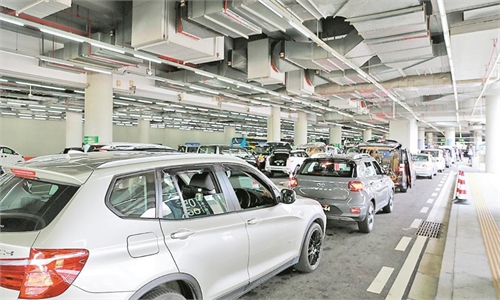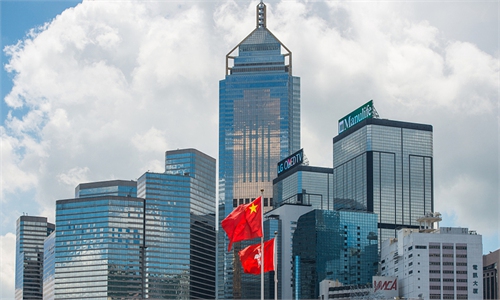IN-DEPTH / IN-DEPTH
Increasing appeal of mainland products and lifestyle reverses flow of HK surrogate shopping, amid Bay area integration
Unifying trends
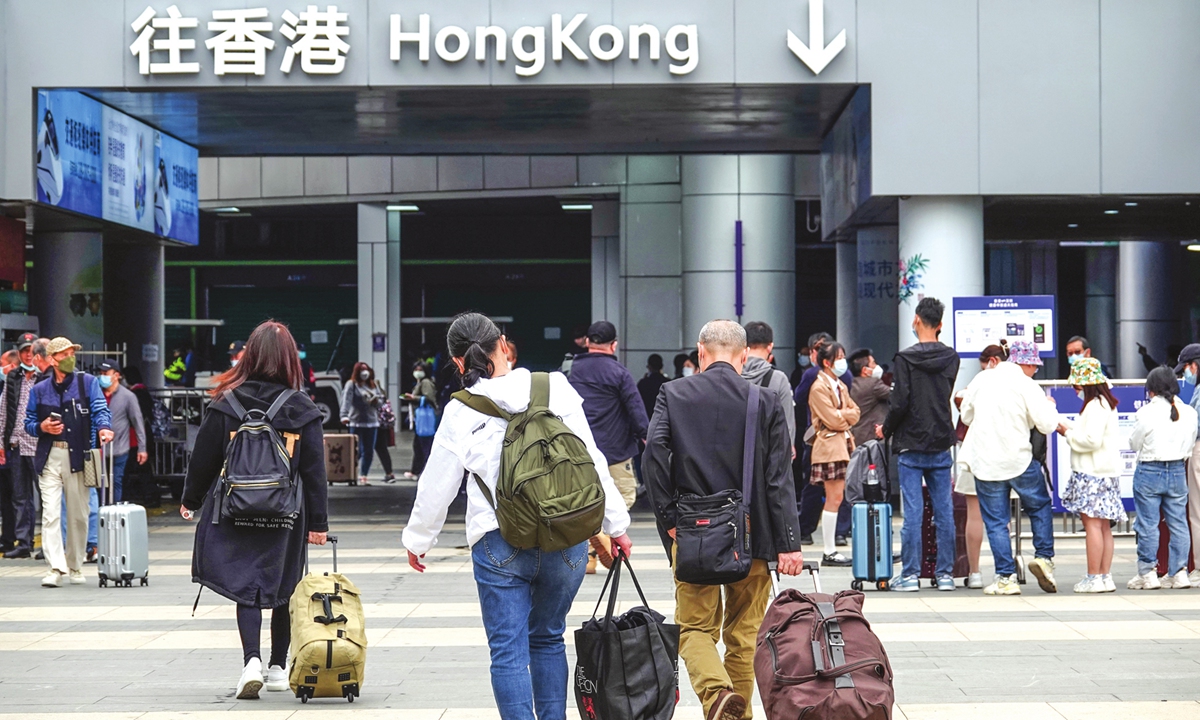
Tourists exit the Luohu Port in Shenzhen for Hong Kong on February 12, 2023. Photo: IC
The surrogate shopping business or "daigou" between the Hong Kong Special Administrative Region (HKSAR) and South China's Guangdong Province is making a comeback. But this time, there seems to be a reverse in the trend. Shenzhen's nimble residents have found a new business opportunity.
"Delivery of Yidiandian milk tea back to Hong Kong. Face to face handover at Kowloon Tong Station." The one-sentence post on the Chinese lifestyle-sharing social media platform Little Red Book had, in less than a day, garnered more than 5,000 interactions.
Choi Wun-lam, a 27-year-old Hong Kong woman who works in Shenzhen, was one of those who saw the post, saying she has witnessed how the phrase "reverse daigou" has become a buzzword on the social media platforms and it "felt like a new world has opened up."
Since the mainland-Hong Kong border fully reopened on February 6, there have been increasingly exchanges between the two cities. However, far from the professional shopper business in Hong Kong actively patronized by mainland shoppers in the past, now, some part-time or even professional shoppers in Shenzhen have started ferrying goods in the other direction. They began shuttling goods between the two cities, upon noticing people in Hong Kong had a keen curiosity for affordable and high-quality food and daily necessities from the mainland, conceiving the idea of not wanting to "return empty-handed" after a trip.
Relevant practitioners and experts contacted by the Global Times noted that the popularity of "reverse daigou" is a reflection of the accelerated integration of the mainland and HKSAR, and a new edition of "A Tale of Two Cities" and other real and vivid stories.
A new shopping trend
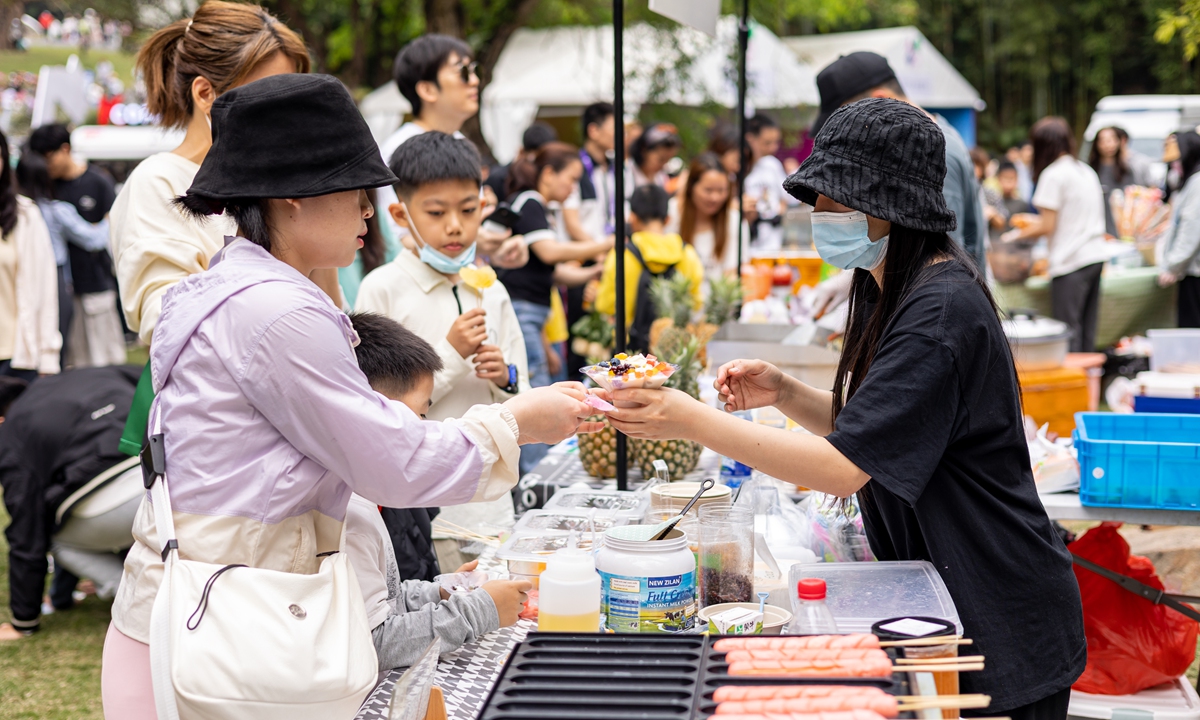
People shop for food at the 2023 Guangdong-Hong Kong-Macao Greater Bay Area Flower Show in Shenzhen, South China's Guangdong Province, on April 8, 2023. Photo: VCG
"[I] commute between Hong Kong and Shenzhen every week. [I can] help you buy cakes, bubble milk tea, braised duck, etc. Other requirements can also be met as long as [they are] not excessive. Low-cost business, only help to buy legal products. [I] obey the law and don't smuggle. Sincerity matters most."
Since Shenzhen resident Tang Tang posted the advertisement on social media in early March, she has received lots of requests to help buy products in Shenzhen and deliver them to Hong Kong in person.
"Reverse daigou" has become another main task during Tang's weekly trip to Hong Kong apart from seeing her boyfriend there. For each trip, she buys products on demand from stores in Shenzhen, goes through customs, and then gives the products to her clients at a certain Hong Kong metro station, which takes her about two hours.
Tang's daigou fee is low. She only charges 6 yuan ($0.87) for a box of four cakes, and 10 yuan for a bottle of milk tea. For each order, she earns 25-35 yuan in total.
Every time, Tang brings along five or six orders for various snacks from Shenzhen to Hong Kong. "Snacks in mainland cities like Shenzhen are known for variety and richness, and the prices are much cheaper than those in Hong Kong," Tang explained.
Most of Tang's Hong Kong clients are young office workers who are "nice and gentle," Tang said.
In screenshots of the chat history between Tang and her clients, which she shared on social media platforms, a client wrote in traditional Chinese characters (the written script used in Hong Kong) that they would recommend Tang to more friends.
Fueled by such enthusiasm, 24-year-old Liu Chuanhao bravely embarked on his cross-border personal shopping business after graduating from university in Shenzhen.
Liu was engaged in the daigou business for Shenzhen clients demanding Hong Kong products starting from 2020, but was soon disrupted by the pandemic. Prior to the pandemic, even as a part-time job, Liu's monthly daigou income was around 20,000 yuan. Currently, with Liu making regular trips across the Hong Kong border once again, his income is steadily recovering. Earning extra money on the way from Shenzhen to Hong Kong has become a new growth point for Liu's business.
From buying snacks to medicated ointments, Liu is impressed with the inherent sense of novelty in every reverse daigou order he receives.
Unlike traditional daigou, shoppers who purchase goods from Hong Kong and then ship them to mainland, Liu noted that his customers would mail the items of online purchase to his address in Shenzhen. Then he would deliver them to Hong Kong for a face-to-face handover.
The daigou trade used to be a massive industry in China. In the past, these agents earned big money by bringing overseas products from Hong Kong to the mainland. In some instances, they assisted mainland consumers in circumventing high import taxes on luxury goods. They also provided access to products that were not readily available in mainland stores, such as certain foreign cosmetics or baby formula.
In recent years, however, with more and more international and Hong Kong brands establishing stores on Chinese e-commerce platforms offering lower prices, daigou shoppers have found that their former competitive advantage is gradually diminishing. "While some small snacks and daily necessities from the mainland are increasingly popular in Hong Kong, we can make money through 'small profits and quick sales,'" Liu told the Global Times.
What excites Choi, who once tried the daigou business in Hong Kong but gave up, is that the entry threshold to launch a "reverse daigou" business is much lower, with no need to run from store to store to personally purchase goods for customers or bear the risk of high custom taxes on luxury goods.
Choi expressed her desire to try this part-time job to cater to her travel expenses during her holidays back to Hong Kong. "Fast and affordable delivery services in mainland are reliable, allowing for same-day order and delivery within a short period of three to four hours or less. It's very exciting to me," she said.
Better value and easier access
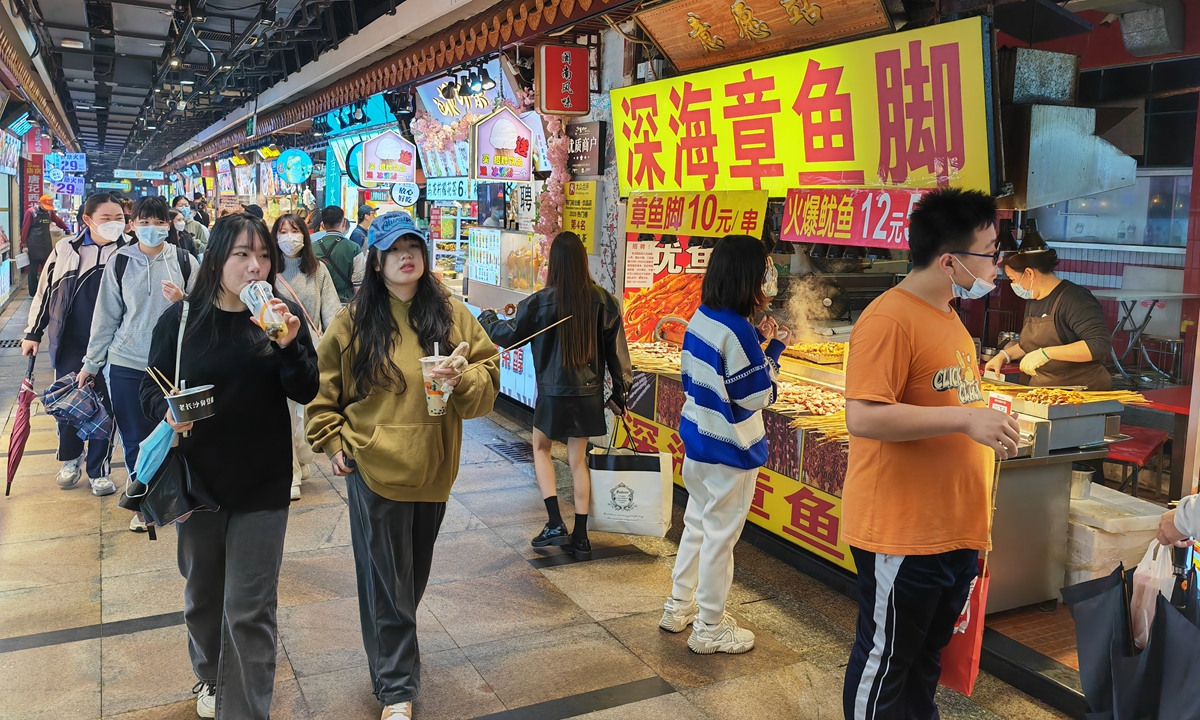
People on a commercial pedestrian street in Shenzhen on January 13, 2023. Photo: VCG
On the Guangzhou-Shenzhen-Hong Kong Express Rail Link, many passengers can be seen carrying branded paper bags containing mainland pastries and bubble milk tea.
Choi noted that because some mainland brands have not yet entered the offline retail market in Hong Kong, so many young people in Hong Kong are eager to try something new, seeking daigou services through social media.
"Hong Kong youth are already proficient in using popular mainland internet apps such as Meituan, Little Red Book, and Douyin. My friends in Hong Kong told me that they would bookmark their favorite foods on these platforms, and if they are unable to go in person, they would contact familiar daigou shoppers to inquire about prices and seek their opinion," she said.
"They are friendly. We talk in Putonghua," Tang noted.
The growing popularity of "reverse daigou" is not surprising to the experts familiar with Hong Kong and Shenzhen economies, who believe it is an inevitable trend that products from the mainland attract more and more Hong Kong consumers.
The quality of many products in the mainland is getting better, being able to meet international leader standards and being favored by Hong Kong residents, said Liang Haiming, an expert on the Hong Kong economy and chairman of the China Silk Road iValley Research Institute.
In the mainland, many drink and snack, such as bread, cakes, bubble milk tea, and barbecue foods, have become famous among customers in recent years through being tasty and successful marketing campaigns, observers told the Global Times.
Since the mainland borders with Hong Kong were reopened, Hong Kong-based consumers who like mainland products can buy much more time-sensitive products like drinks and snacks with the help of "reverse daigou" shoppers, Liang said.
Deeper, all-round integration
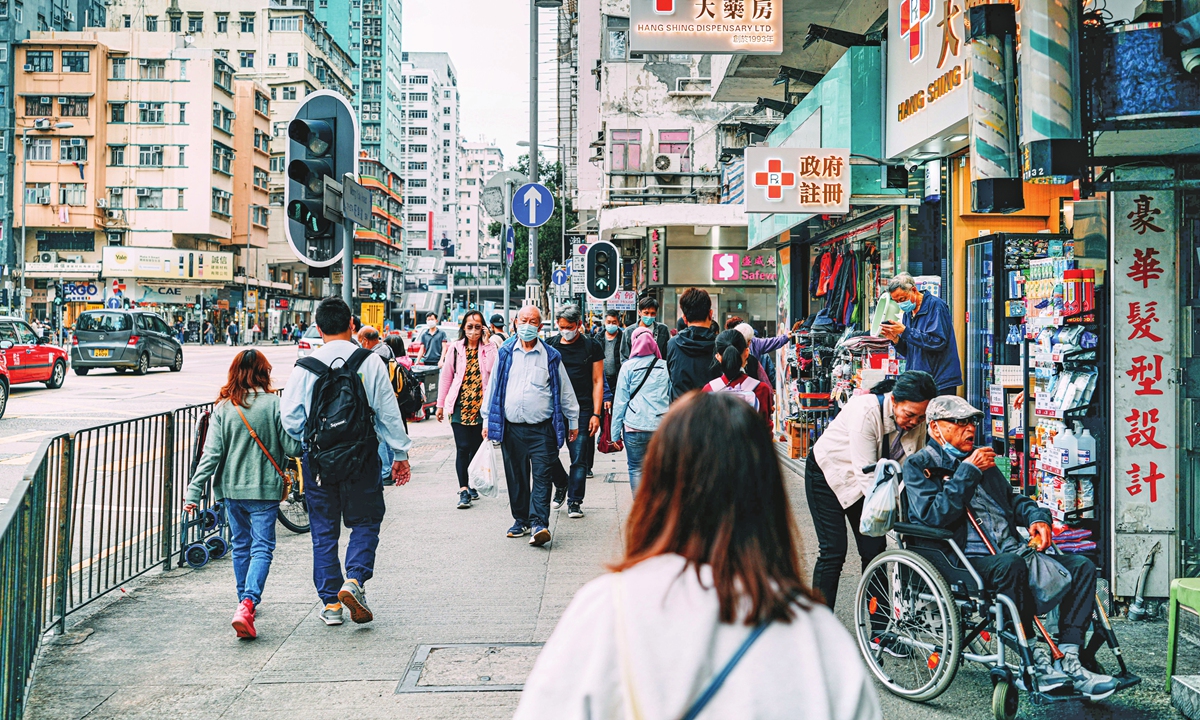
A view of a street in Hong Kong on April 1, 2023. Photo: VCG
"In fact, more often than not, Hong Kong citizens prefer to go to Shenzhen or other cities in the mainland to experience the charm there first-hand," Choi said.
During an interview with the Global Times, Choi mentioned an interesting phenomenon: At weekends or during holidays, nearly half of the crowds at Shenzhen's night markets and restaurants near the Shenzhen border are people from Hong Kong.
According to data issued by HKSAR Immigration Department, from March 22 to April 4, the total number of mainland visitors to Hong Kong from the six major ports in Shenzhen was 540,000 person-times, while the total number of Hong Kong residents entering Shenzhen reached 1.85 million person-times.
Observers pointed out that with the development of the internet, the information gap between the mainland and Hong Kong has gradually been narrowed, allowing more Hong Kong people to have a new understanding of the mainland and generate interest in exploring mainland cities.
The well-developed and convenient transport network in the Guangdong-Hong Kong-Macao Greater Bay Area (GBA) also plays an important role in this trend. Since January 8, Shenzhen and Hong Kong have realized the mutual recognition of the subway networks by scanning QR codes, further facilitating the travel of people in both places.
"The journey from my home in Sha Tin to Shenzhen takes a similar amount of time as going to places like Causeway Bay in the Hong Kong city center, sometimes even shorter," Choi from Hong Kong said.
In the process of communicating with Hong Kong residents, Tang also noted that she felt many local people now have a much stronger regional identity than in previous years, being pleased to be a member of the GBA.
"The cultures in Hong Kong and mainland share the same origins, many Hong Kong residents have ancestral roots in the mainland. To the young people in Hong Kong, tasting the variety of the mainland's foods is a step in getting to know the mainland's culture, including the rich gastronomy," said Liang. It has increasingly prompted Hong Kong's youth to further love their country and its culture, he added.
On some trendy things, Liu noted that young people in Shenzhen and Hong Kong like the same idols, go to the same anime conventions, and sing in unison at the same live concerts.
With similar palates, shopping habits, and interests, young people in the GBA have shared preferences as a whole. This is a sign of GBA cities enjoying deeper integration in economy and other aspects in recent years, not only reflected in the shortening of physical distance and the slant of policies, but also in the integration of daily life and psychological identity, Liang said.
Hong Kong's development will be further integrated into the GBA, seizing the opportunities and dividends of Chinese mainland's steady development, he said. "That is the [best] way of promoting Hong Kong's future development."


